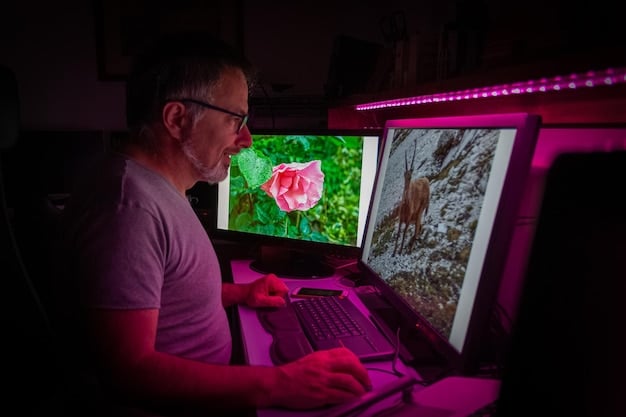The Rise of Indie PC Games: Unearthing 2025’s Best Hidden Gems

The rise of indie PC games in 2025 highlights a vibrant ecosystem where innovative gameplay, unique narratives, and artistic expression thrive, offering players exciting alternatives to mainstream titles.
The surge in indie PC gaming continues unabated, promising a landscape brimming with innovation and creativity. **The rise of indie PC games: Discovering hidden gems in 2025** is set to be an adventure, offering players unique experiences far removed from the AAA titles dominating the market.
The Evolving Indie Landscape
The indie game scene has transformed significantly in recent years. It’s no longer just a niche corner of the gaming world but a dynamic force driving innovation and creativity.
We’re witnessing a shift in how games are developed and consumed, with indie developers taking center stage. What factors are contributing to this exciting evolution?
Democratization of Game Development
The accessibility of game development tools and resources has played a crucial role. Affordable software and online tutorials empower individuals and small teams to bring their visions to life.
Platforms and Distribution
Platforms like Steam, Itch.io, and GOG have provided indie developers with direct access to a global audience. This eliminates the need for traditional publishers and allows for greater creative control.

The indie game landscape is constantly evolving, driven by passion, innovation, and a desire to create something truly unique. Players in 2025 can expect an even wider range of experiences, pushing the boundaries of what games can be.
Spotlight on Emerging Genres
Indie games are often at the forefront of genre innovation, experimenting with new mechanics and blending established genres in exciting ways.
In 2025, several emerging genres are poised to capture the attention of players. What are some of the most promising trends?
- Narrative-Driven Adventures: Games that prioritize storytelling and character development, often featuring branching narratives and meaningful choices.
- Roguelite Deckbuilders: A fusion of roguelike elements and deckbuilding mechanics, offering endless replayability and strategic depth.
- Cozy Simulators: Relaxing and immersive simulation games focused on crafting, farming, and building communities.
- Experimental Art Games: Games that prioritize artistic expression and evoke unique emotions, often challenging traditional gameplay conventions.
These emerging genres demonstrate the versatility and creativity of indie developers. It’s a landscape ripe with experimentation, offering players experiences that are both thought-provoking and deeply engaging.
Tools and Technologies Shaping Indie Development
Advancements in tools and technologies are empowering indie developers to create games with greater efficiency and visual fidelity.
From game engines to AI-powered tools, these innovations are revolutionizing the development process. How are these technologies impacting the indie scene?
Game engines like Unity and Unreal Engine have become increasingly accessible, offering a wide range of features and assets. These engines empower developers to create visually stunning games without requiring extensive programming knowledge. AI-powered tools are also emerging, automating tasks such as animation and level design. This allows indie developers to focus on the creative aspects of their games, resulting in more polished and innovative experiences.

The integration of these tools and technologies is accelerating the pace of indie game development, enabling smaller teams to create games that rival the quality of AAA titles. This trend is expected to continue in 2025, further blurring the lines between indie and mainstream gaming.
Marketing and Community Building Strategies
In the crowded world of gaming, effective marketing and community building are crucial for indie developers to stand out.
Reaching potential players and fostering a loyal fanbase requires innovative strategies. How are indie developers approaching this challenge?
Social Media Engagement
Platforms like Twitter, Discord, and TikTok are essential for connecting with players and sharing updates. Engaging content, behind-the-scenes glimpses, and interactive Q&A sessions can build a strong community.
Early Access and Playtesting
Releasing early versions of games to gather feedback and build anticipation is a popular strategy. This allows developers to iterate on their designs and create a game that resonates with their audience.
Collaborations and Cross-Promotion
Partnering with other indie developers, streamers, and content creators can expand reach and introduce games to new audiences. Cross-promotion and collaborative events can generate excitement and build a sense of community.
These marketing and community-building strategies are essential for indie developers to thrive in a competitive market. By fostering a strong connection with their players, they can build lasting relationships and ensure the success of their games.
Funding Models and Sustainability
Securing funding and ensuring long-term sustainability are ongoing challenges for indie developers.
Exploring alternative funding models and building sustainable businesses are essential for the health of the indie scene. What are some of the most promising approaches?
- Crowdfunding: Platforms like Kickstarter and Indiegogo allow developers to raise funds directly from their fans. This can provide crucial seed money and validate the demand for a game.
- Grants and Government Support: Many countries and organizations offer grants and funding programs to support indie game development. These programs can provide financial stability and allow developers to focus on their creative work.
- Subscription Services: Offering games on subscription services like Xbox Game Pass and Apple Arcade can provide a steady stream of revenue. This model can also expose games to a wider audience and increase their visibility.
These funding models and sustainability strategies are vital for ensuring the long-term health of the indie game scene. By diversifying their revenue streams and building sustainable businesses, indie developers can continue to create innovative and engaging games for years to come.
The Future of Indie PC Gaming Beyond 2025
The future of indie PC gaming is bright, with continued innovation and growth on the horizon. As technology advances and the indie scene matures, what can we expect to see beyond 2025?
We can expect to see even more experimental and boundary-pushing games, as developers leverage new technologies and explore uncharted territory. The rise of virtual reality (VR) and augmented reality (AR) could open up new possibilities for immersive and interactive experiences. We may also see a greater emphasis on accessibility and inclusivity, with developers creating games that are welcoming to players of all backgrounds and abilities.
AI and Procedural Generation
AI and procedural generation will likely play an increasingly important role in indie game development. These technologies can automate tasks, create dynamic content, and generate unique gameplay experiences.
Cloud Gaming and Streaming
Cloud gaming and streaming services will continue to expand, making indie games more accessible to players around the world. This could level the playing field and allow smaller developers to compete with larger studios.
The future of indie PC gaming beyond 2025 is full of potential. As the indie scene continues to evolve, we can expect to see even more innovative, engaging, and thought-provoking games that push the boundaries of the medium.
| Key Aspect | Brief Description |
|---|---|
| 🎮 Indie Innovation | Indie games are driving innovation in genres and gameplay. |
| 🛠️ Tech Advancements | New tools and technologies are empowering indie developers. |
| 📣 Community Focus | Indie developers are prioritizing marketing and community building. |
| 💰 Funding Models | Diverse funding options are critical to indie game sustainability. |
FAQ
Indie PC games are generally created by individuals or small teams without the financial backing of major publishers, allowing for greater creative freedom.
Their innovation, unique narratives, and accessibility have increased their appeal, offering fresh experiences compared to mainstream titles.
Platforms like Steam, Itch.io, GOG, and gaming communities are great places to explore and find hidden gems.
Emerging genres like narrative-driven adventures, roguelite deckbuilders, and cozy simulators are set to gain more attention.
Indie games drive innovation, experiment with new mechanics, and offer diverse perspectives that enrich the gaming landscape.
Conclusion
The indie PC gaming scene in 2025 is a vibrant and dynamic ecosystem driven by passion, innovation, and a desire to create unique experiences. By embracing new technologies, fostering strong communities, and exploring alternative funding models, indie developers are poised to continue pushing the boundaries of the medium and delivering unforgettable games to players around the world.





